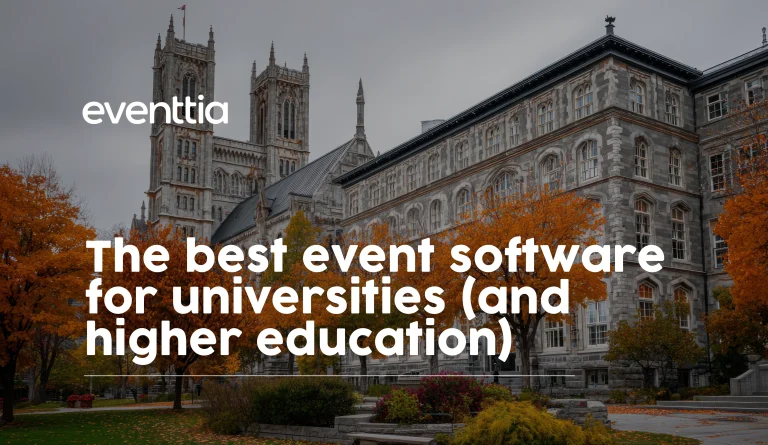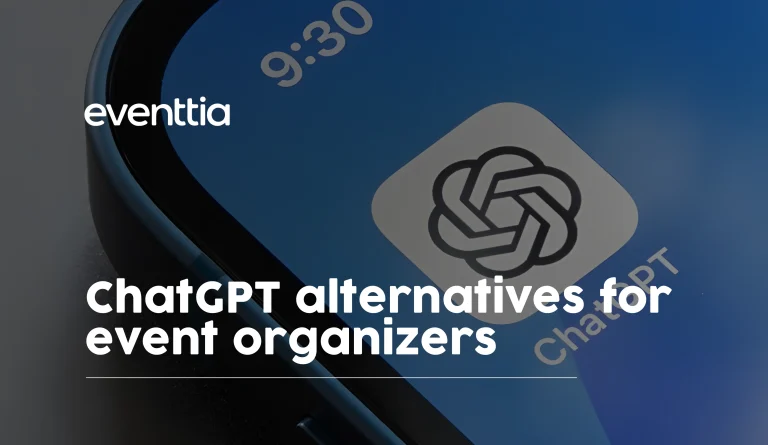Many organizations have been embracing events as an effective way to market their business and products/services.
However, why let the opportunity of generating revenue from these events go to waste if we can do it while still effectively promoting our brand, product, service, or community?
While many businesses understand that their events (both live and virtual) could be monetized, in practice, monetizing any event can be quite challenging if you don’t know where to start.
If you are an event planner or a business seeking to generate revenue and turn a profit from your events, you’ve come to the right place.
In this article, we will discuss the available options that can help you choose the best way to increase your revenue from your live and virtual events, and let’s start by addressing the elephant in the room: should you monetize your event?
Paid or Free Event? The Advantages of Monetizing Your Event
Many event planners are faced with the dilemma of whether to host the event for free or to monetize it, especially if the event is not yet popular.
After all, hosting the event for free will ideally attract more attendees due to the lower barrier of entry. Yet, in practice, that’s not always the case.
With that being said, here are some advantages of monetizing your event instead of hosting it for free:
→ Better-quality attendees
Attracting many attendees to an event won’t really bring too much value if they aren’t a good fit for the event, your business, and your sponsors.
For example, if your event is intended to support a product launch, there’s no use in attracting 1,000 attendees, but only 10 of them would actually buy the product.
By monetizing your event, for example, by selling tickets, you can filter your attendees so only those who are really interested in your event and the subject you’ll be tackling will actually attend.
In short, quality over mere quantity.
→ Higher participation and engagement rates
A relatively low attendance rate despite a high number of registrants is a common issue in free events. On the other hand, if someone paid for an event, it’s quite likely they’ll actually attend.
Also, people will be more interested in participating in activities throughout the event and stay focused on the event’s content when they’ve paid for it.
→ Creating a sense of exclusivity
It’s no secret that people tend to perceive things that are offered for free as cheap. Most people value the things they got by what they had to sacrifice (or forgo getting) to obtain it.
Thus, if you get something for free, the value is zero since you gave nothing to get it.
Assigning a price to your event (even if it’s not very expensive) can help create a sense of exclusivity, and your attendees will view your event as more valuable.
→ Allows you to invest more
Monetizing and generating revenue from your event allows you to recover the investment you’ve made in planning the event.
Meaning, that if you can generate more revenue, technically, you can invest more money to plan a better event (i.e., more expensive venue, more expensive talents/keynote speakers, and so on.)
→ Generate additional revenue stream
Last but not least, monetizing your event means creating a new revenue stream, which will ultimately translate into more opportunities.
If you are currently struggling to grow your business, monetizing your events and planning more events can allow you to re-invest the generated revenue into your brand.
This additional source of revenue may help scale your business faster.
The Post-Pandemic reality: is it Okay to monetize your event now?
Many event planners hesitate to sell tickets for their events or monetize the event in any other way due to the fear of low attendance, especially for live/in-person events.
It’s no secret that the event industry has been heavily affected by the global COVID-19 pandemic in 2020 and 2021, causing many live events to be cancelled or postponed.
However, in Q2 2021, Eventbrite, one of the most well-known event ticketing websites in the US, reported a revenue of $46.3 million, which is an increase of over 500% from the same quarter the previous year, and paid ticket volume has also increased 57% from the previous quarter (Q1 2021.)
As we can see, the increase in paid ticket volume shows that people are eager to attend live events and are willing to pay for them.
In 2022 with the rising vaccination rates and the easing of the majority of COVID-19 restrictions, we can expect the volume of paid ticket sales to continue rising.
In short, yes, it’s definitely a good time to start monetizing your events, whether it’s in-person, virtual, or hybrid.
How to monetize your event?
There are many different ways you can monetize your event to generate more revenue; some might be more appropriate for your event type and/or where your business is at the moment.
With that being said, here are the most common ways to monetize your events that you can consider:
💲 Monetize your event by selling tickets
The most basic way to monetize an event is to charge for tickets. But how can we do it properly?
Here are some actionable tips you can try:
→ Create and communicate value
Your attendees would be willing to pay to attend the event if they perceive the event as valuable. For example, if it’s a concert event featuring a band they really like, they’d be willing to pay even if the ticket is expensive.
So, the key when monetizing an event by selling tickets is to plan a valuable event and properly communicate its values to the target attendees.
The secret here is to understand the needs of your target: why do they attend an event? What are their pain points? Who’s the talent/speaker they’ll be willing to spend money for? What types of content would they like?
The better you understand your target audience, the better you can plan and host an event they deem as valuable.
→ Create FOMO via early-bird discounts
Simply put, an early bird discount or offer is selling your ticket at a lower price for a limited amount of time, typically very early in the registration process.
Being a limited-time offer in nature, early-bird discounts can instil a sense of urgency, encouraging prospective attendees to purchase your ticket faster unless they’ll miss the discount period.
For attendees, committing early to events carries a risk, and the early-bird discount can help lower this obstacle. On the other hand, for the event planner selling more early-bird tickets can allow them to generate revenue faster and maintain a healthier cash flow.
Selling your tickets with early bird discounts should be a core part of your event marketing and ticketing strategy, as the benefits you’ll get from the campaign can be massive not only before and during the event but also after.
Besides creating some sense of urgency to encourage purchase, another key benefit of selling early bird tickets is the fact that you can collect customer data earlier for marketing purposes.
The more you understand your target attendees, the better you can market and promote your event.
With that being said, collecting customer data is very important, and the earlier you can do so, the more value you’ll be able to extract from it. Offering early bird discounts allow you to get a jumpstart on this data collection.
For example, if the people purchasing your early bird tickets aren’t from the demographics you expected, then you may want to adjust your marketing/promotion strategy.
You can also leverage this collected data for current or future promotional efforts. For example, launching a targeted Instagram ad targeting users from the same age group as those who purchased your early bird tickets.
→ Examples of early bird discounts application
Coachella is one of the most popular music festivals in the world and is a good example of how to effectively use early bird discounts to generate buzz.
Held annually, Coachella’s early bird tickets are always heavily sought after by prospective attendees all around the world.
Tiers determine ticket prices, the smaller the tier, the earlier the ticket is purchased, and the cheaper it is.
For Coachella 2022, Tier 1 pass prices for general admission start at $449 before fees, tier 2 at $474, tier 3 at $499, and finally, tier 5 at $549.
This is also a good example of how we should price different early bird discounts. There is a pretty substantial price difference between tiers (around $30), but the difference isn’t too steep so it will discourage attendees that failed to get the previous tier.
With Eventtia event management platform, you can easily set up multiple early bird ticket tiers to implement the same strategy for your event.
→ Leveraging coupon codes to amplify the event’s reach
Another monetization strategy that is still related to selling tickets is to leverage coupon codes to sell more tickets.
There are many different ways you can leverage coupon codes or promo codes. For example, offering special discounts for specific groups of people (i.e., refugees.)
You can also offer special coupon codes to your talents/speakers, team members, and sponsors, so they can, in turn, use the codes to invite their audiences.
💲 Monetize your event with sponsorships
If your event has a large enough audience and if it’s attractive to prospective sponsors, then sponsorship can be a viable option to monetize the event.
The secret here is whether you can convince sponsors that your event was worthy of their spending; whether your event can generate substantial value for them.
You’ll need to convince prospective sponsors that your event’s attendees match their target demographics in sufficient quantity. So, you might want to grow your audience first before approaching sponsors; they’ll obviously want to reach as many people as possible.
Decide how you can provide value to these prospective sponsors, and create an attractive and personalized proposal to communicate these values.
Remember, however, that sponsorship is supposed to be a two-way relationship, so do your part.
Align your event with sponsors so that your event can add value to your sponsors without sacrificing your guest’s attendance experience.
💲 Monetize your event by selling your own products and merchandise
Your event (both in-person and virtual) can be a great place to promote and sell your product or service, as well as event merchandise.
In in-person events, the common approach is to open booths where you can perform product demos to attract your attendees, and you can emulate the same approach in virtual events by hosting product demo sessions to position your products and services.
Here are a few tips:
- The key to successful product/service/merchandise sales is to make sure these items are directly related to your event’s content.
- Make it as easy as possible for attendees to buy your goods, make appointments, or sign-up for your offers.
- You can sell your merchandise during registration with Eventtia’s merchandising module, so attendees can opt whether to buy your merchandise on top of their registration tickets.
- Be confident that what you are offering is valuable. If you hesitate, people will lose interest and may see you as not credible.
💲 Monetize your event using advertisements
Advertisements can also be a great way to monetize your events, but keep them in moderation not to disrupt your attendee’s experience too much. They are there to enjoy your event and your content and not be bombarded with promotions.
If you have sponsors, obviously, you should offer them advertisement slots as a part of the sponsorship packages, but you can still offer the slots to other brands that are not your sponsors.
In live/in-person events, you can put advertisements as a part of your stage, banners, electronic displays, and other formats. In virtual events, on the other hand, you can sparingly show advertisements throughout the live stream, but keep them fairly short so as not to disrupt the event’s content too much.
Wrapping Up
All events, be they in-person, virtual, or hybrid, all have great potential to be monetized, as long as you can recognize and leverage the available opportunities. Above, we have also discussed the most effective ways to incorporate optimal monetization in your event without disrupting the attendance experience.
It’s crucial to remember that each event is unique, and so you’ll also need a unique monetization approach for each. Assess the content and its target attendees, and carefully choose which methods work for your event and its audience.
Discover how Eventtia helps world-leading brands digitize and scale their events
Learn moreShare





